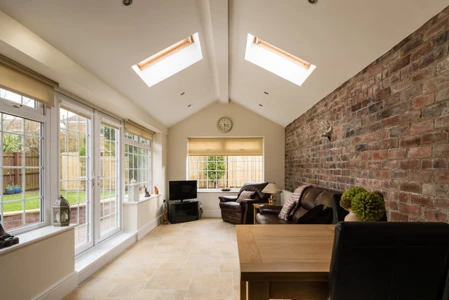Are you dreaming of expanding your living space without the hassle of moving? With the current cost of moving house increasing1, a home extension might just be the right solution for you. Not only could it provide you with the extra room you need, but it also has the potential to add value to your property.
With so many options available - a front house extension, rear house extension, loft conversion, flat roof, pitched roof, single storey extension, or two-storey extension, - it can be confusing knowing where to start and who to go to to get your information.
We’re going to give you the low-down on home extensions, including planning permission and building regulations, costings, and tips for choosing your architect and builder.
Planning permission for extensions
Determining whether you need planning permission for an extension can be daunting.
Generally, larger and more significant improvements require permission from your local government, while smaller, less obtrusive improvements are classified as permitted development.
To avoid the need for planning permission for your extension plans, it is important to ensure they comply with specific regulations. Consulting with a surveyor is highly recommended before commencing any extension work, as they can provide guidance on whether planning permission is necessary or not.
You may also need to have a Party Wall Agreement drawn up between yourselves and any neighbours whom the building work might affect.
Please note - if you’re planning to extend a new build house then you might need permission from the developer, which may incur additional fees.
Building regulations for extensions
Building regulations are essential for any extension project to ensure that the work carried out meets structural requirements, including drainage, electrics, and walls. To comply with these regulations, you'll need detailed plans drawn up by an architect, which you can then submit for approval.
To read the full list of planning permission and building regulations, visit the government website or contact your local council for more information.
How much is a house extension?
There are lots of different suggestions out there on how much an extension costs, however, this will vary depending on what you want and also where you live.
A lot of these figures are worked out per square meter, for instance, a single-storey extension would typically cost around £1,500 to £2,500 per square metre. So if you’re planning a small single-storey extension measuring approximately 20 square metres, you can expect to pay anywhere from £30,000 to £44,000 for a basic or mid-range extension.2
Once you know what sort of extension you’d like, we recommend organising property visits with a few builders to give you an accurate quote for the cost.
Choosing your architect and builder
When looking for an architect and builder for your dream home, it's essential to choose trustworthy and experienced professionals. Recommendations from family and friends can be a valuable starting point.
When working with an architect, it's important to communicate your requirements effectively and make sure they are listening to your wishes. An architect's knowledge and expertise can also be helpful in finding solutions to any challenges that may arise. They may also be able to recommend a builder from their network.
When selecting a builder, reviewing their portfolio and discussing the project details with them can help you understand their capabilities. Requesting quotes from multiple builders can also provide insight into the project's costs.
It’s also important to consider the timeline. A builder with a lower quote but a longer wait time may not be the best fit if you need to move in quickly. Ultimately, selecting the right architect and builder is key to achieving your dream home, so taking the time to research and make an informed decision is worthwhile.
Funding your home extension
There are several options for how you can fund the project. You can take out a loan for the house extension from your existing mortgage lender. Read more about how remortgaging works.
If your current mortgage deal is coming to an end soon anyway, then it’s the perfect time to think about remortgaging and use some of the equity you’ve built up to pay for, or put towards, the extension. At Mortgage Advice Bureau, we work with more than 90 different lenders and have access to over 12,000 different mortgage products, so we can help find the right one for your circumstances.
Seeing as mortgage rates are low right now, it’s worth shopping around to see if you could be a on a cheaper rate perhaps by switching to a different lender. At Mortgage Advice Bureau, we work with over 90 different lenders and have access to over 12,000 different mortgage products, so we can help find the right one for your circumstances.
See if you could save yourself some money by getting in touch with us today.
Important information
Your home may be repossessed if you do not keep up repayments on your mortgage.
There may be a fee for mortgage advice. The actual amount you pay will depend on your circumstances. The fee is up to 1% but a typical fee is 0.3% of the amount borrowed.
You may have to pay an early repayment charge to your existing lender if you remortgage.

